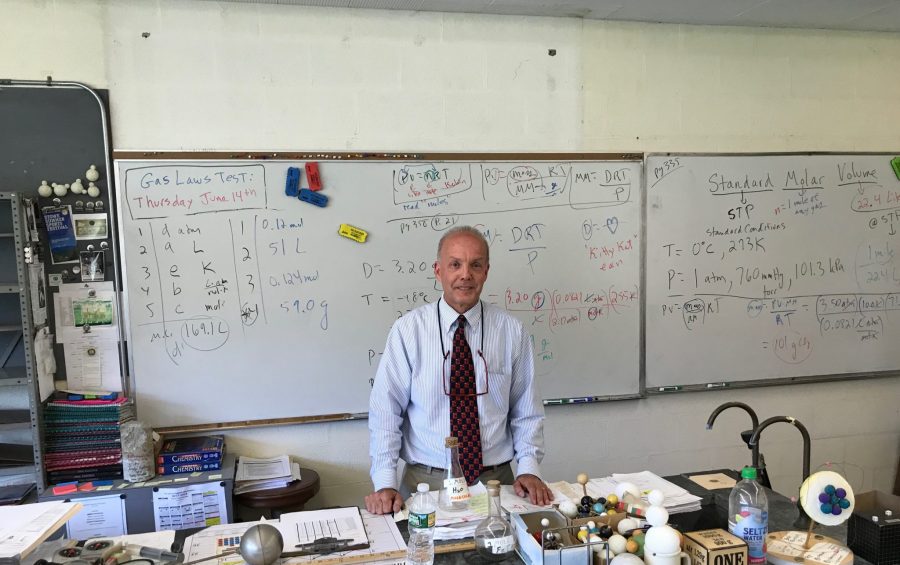An Interview with Scott Burdick
Chemistry teacher and cross country coach Scott Burdick gave his last lecture on Tuesday, as he is retiring from teaching. The Echo sat down with him to reflect on his time at Mount Greylock.
Echo: Today was the last chemistry lecture of your career. How does that feel?
Burdick: You know, you get so into it that you don’t even realize that till later on, because things have been going like this for so many years, but it was really fun, I really enjoyed it. As you get to realize it, you kind of reflect on things, you do think about things a little at the end.
Echo: What will you miss the most about Mount Greylock when you retire?
Burdick: Well, a couple things, obviously, there’s a lot. The people are great. I’ve taught at three high schools, and this is just a wonderful place to teach. My colleagues and my students are great. I’m going to really miss teaching chemistry; I love teaching. And I will still coach for a little while, I think, but I’m definitely going to miss being at school. It’s something that you’ve done your whole life. What’s nice is that hopefully because I’ll keep coaching I’ll still be involved a little bit.
Echo: Do you have any memories or things you’ve learned that will stick with you?
Burdick: Well, the one thing I’ve learned is that everybody’s job is hard in different ways. Everybody’s job is different and unique, and it somehow all comes together.
Echo: How has your teaching experience changed as you have taught at the different high schools?
Burdick: It’s hard to say, because the schools could be different, but I’m also very different. When I first started teaching I was right out of graduate school, and I taught right outside of Boston in Eastern Mass, so very different. Very suburban. Then I taught for ten years at Taconic, which is in the county’s largest city, so it was more urban, and I really enjoyed that. And then I came here, which is in the middle of those two. The kids are more similar than different at all. People always say, “oh, kids have changed,” but kids haven’t changed. Kids still have the same hopes and dreams, and wanting to do well in class, and fit in… kids haven’t changed at all. The teaching and the coaching have been the same; kids are really just kids, wherever you are, more the same than different.
You’re retiring at a time in which the whole school is closing down to move into a new building. How does that impact the retirement process?
One way that it has impacted me personally is that before, every person that retired was able to just clean their desk and go, and leave all the equipment for the next person. That didn’t happen for me (laughs). But in some ways it’s been really good, and it’s been kind of cathartic going through all my stuff over thirty-four years. Everything’s here of all I’ve done. I went to high school here, and I found some things from went I went to school here. So it was really kind of therapeutic, with me leaving, to do that. I spent a lot of time here. I was actually a long-term sub, it’s kind of a funny story, kind of how I got into teaching actually, I was going to be a chemical engineer… I was going to go to Notre Dame, but after my sophomore year of college my little sister was taking chemistry. My chemistry teacher was out for the whole year, and it was Ms. Barrett’s year with all her friends, and I guess you can have a sub for a day or so, but it’s hard to have one for the whole year. The final was coming up and they were getting worried. My sister went to the principle and said that they were worried about the final. She said that “my brother’s a chem major and is getting back from college.” I got a call from the principle that night and he asked me. I said no, and he said “why don’t you just come in and we’ll talk about it,” so I came in the next day and he told me to go to the room and start teaching. I did, and I really enjoyed it. There are a lot of memories in this building. It’s like if you grew up in a house and someone’s tearing down the house that you once lived in. The more I think about it, though, I realize that the building does not have memories; the people have memories. What goes on inside these walls is way more important than what they are made of. The people here are really good. My colleagues are really good. To be able to teach here with some of the teachers here, what a privilege to be able to teach with them.
Echo: What are you most looking forward to for retirement?
Burdick: Well, I don’t have very many plans. What I’m looking forward to doing most is doing what I want to do. I mean, I’ve been doing what I want to do forever, but it’s kind of funny, you pick your career at what, 17,18 – what you’re going to major in – and as you get into your late 50s, you might find you have different interests. I’ve always loved chemistry, but I’ve also developed new interests that I didn’t have before. I’ll just be able to do whatever I enjoy without worrying about money. Maybe it will be in education, maybe not, I don’t know. I have no set plans right now. I really just feel like it’s time to get out of the way for someone younger. I think it was a year ago that I was collecting lab reports and one student said that they had shared it with me over Google Docs, and that’s when I realized that it was someone else’s turn.
Editor’s note: This interview has been condensed by Echo staff.
Owen has been on Echo staff for three years. When not writing, editing, and publishing stories, he can be found doing nerdy things (playing the piano, participating in Model UN), stupid things (skiing up hills - apparently that's a thing?), and productive things (watching Greys Anatomy). He loves editing the Echo because pestering other people about deadlines is his specialty.









